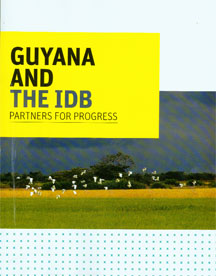Private sector investment in Guyana continues to be confronted by “significant hurdles” arising out of difficulties associated with the administration of justice according to a recently released review of the work of the Inter-American Development Bank (IDB) in Guyana.
 The 57-page document titled Guyana and the IDB: Partners For Progress cites “human resource and financial challenges in the country’s justice system which it says are attended by outdated procedures and persistent “gaps” in the coverage of services.
The 57-page document titled Guyana and the IDB: Partners For Progress cites “human resource and financial challenges in the country’s justice system which it says are attended by outdated procedures and persistent “gaps” in the coverage of services.
The report alludes to a survey of local manufacturing firms initiated by the IDB in which 43 per cent of participants with recent experience in local courts identified the country’s legal system as “a major obstacle to their business operations.” Another 30 per cent of participants in the survey cited “crime” as one of the major constraints to doing business in Guyana. Thirty-eight per cent of the participants in the survey had been “victims of theft or vandalism.”
The IDB report also alludes to a 2009 World Bank Survey on Doing Business around the World which says that the enforcement of a contract in Guyana “typically requires 581 days – at a cost of about 25 per cent of the amount of the original debt.” The report says that these findings make “abundantly clear” that plans to improve the business climate in Guyana must, of necessity, include interventions in the justice system that seek to strengthen its accountability and efficiency, improve relations among institutions in the sector and facilitate improved access to justice.
The IDB report says that the application of resources aimed at correcting these deficiencies include initiatives designed to strengthen the country’s Judicial Service Commission (JSC) by seeking to develop its governance policies, operational rules and regulations. Envisaged corrective measures also include the drafting of a revised code of conduct and ethics for judges and magistrates. Additionally, the report says that efforts to reduce the backlog of cases, accelerate decisions and simplify civil and criminal procedural laws will be pursued through the implementation of a new case-flow management procedure within the legal system.
Further IDB-supported improvements to the effectiveness of the administration of justice in Guyana will be pursued through ‘the transfer of prosecution responsibilities from the police to state-appointed prosecutors, the training of cyber crime and money-laundering specialists and increased information-systems support.”
Meanwhile the IDB report suggests that previous analyses of the country’s justice system may have been erroneously focusing of the functioning of particular institutions in isolation from the system as a whole. It says that the design of the current project designed to infuse corrective measures into the system focuses on “an alternative view” that seeks to promote changes in the relationships of the various institutions within the justice system to each other.
“The project supports more efficient interaction among justice institutions through ‘top-down’ and ‘bottom–up’ approaches. Top-down interventions concern sector-wide policy, planning and resource allocation, whereas bottom-up approaches enhance communication, co-ordination and cooperation among institutions at the local level. “
And according to the IDB report the efficient production of goods and services for local and international markets continues to be dogged by challenges that include the high concentration of exports in a few resource-based areas and difficulties associated with finding ways of reducing production costs.
It adds that while the country’s productive sector has found ways of enhancing its competitiveness “in the last few years,” more still needs to be done in this area. It recommends resort to international indicators that “identify key areas, define standardized cases of situations to be measured, attach scores and rank countries on the basis of competitive measures as a means through which the country’s productive sector can reliably measure progress made in its own competitiveness.”
The IDB report identifies six areas which it considers essential to the effective evaluation of the strength of public governance citing “control of corruption” as a critical area. The report also lists government effectiveness, political stability, regulatory quality, rule of law and voice of accountability as key barometers for measuring the strength of public governance.
The IDB report alludes to a tracking mechanism employed by the World Bank to chart the progress of 212 countries in these six areas and which records an improvement from 60.2 per cent to 62.8 per cent in the state’s effectiveness in controlling corruption between 1996 and 2008.
Between 1977 and 2008 Guyana and the IDB collaborated on 58 loans totalling more than US$1 billion.
In an introduction to the report IDB Caribbean Country Department Manager Dora Currea alluded to the Bank’s US$356 million debt relief intervention in Guyana in May 2007 in the context of the Multilateral Debt Relief Initiative (MDRI) designed to respond to the large stock of debt which the country had carried from the 1970’s and 1980’s. Currea noted that during this time “market prices had declined on the nationalized commodities of sugar and bauxite while the cost of oil surged and government spending remained high,” compelling Guyana to finance its deficits through external borrowing, “a pattern that led to unmanageable debt to GDP levels. Currea noted that as a result of the MDRI and IDB debt relief Guyana’s external debt to GDP ratio declined by 73.4 per cent by December 2007.
In the introduction to the report Currea also alludes to IDB interventions aimed at “unlocking development bottlenecks across different areas” including infrastructure, state reform, competitiveness and private sector development.
